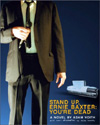
Adam Voith's stories arrive in curious packages
by Lloyd Babbit
Good writers have a nasty habit of sneaking up on you in the strangest places. I found this out the first time I chanced upon the work of Seattle-based writer Adam Voith. My first experience with Voith wasn't in the friendly confines of a bookstore, or in a college classroom, or even in the quiet rows of the library. Rather, I first found Voith at a Pedro the Lion show just over the mountains in Asheville.
It sounds like an odd place to discover a writer's work. But then, Voith is odd in a lot of ways. He's a scruffy, longhaired fellow who fears spiders and books shows for bands on the side. He watches television like a madman, eats fast food hamburgers with alarming regularity and revels in the joys of video games (all of which seem like brain-cell killing, corporate anathema to much of the literary community).
But literary community be damned, Voith is a talented wordsmith. I discovered that in Asheville three years ago as I purchased obligatory band merchandise. Placed strategically next to Pedro the Lion albums and T-shirts were copies of Voith's first book, Bridges with Spirit. I purchased it from the anxious-looking guy behind the table (whom I later realized was Voith himself) and was on my way.
Bridges wasn't my cup of tea. It's a narrative of part-fictional, part-autobiographical stories, pseudo poems, travel diaries and even a play. All are connected, but few of the bits are enough to keep the reader engaged. Some, like the story of how a Beatles song may have been written about the narrator's father, or the narrator's memories of his best friend's funeral, are a delight. Much of the rest is scattered.
But Voith himself did hold my interest. I later learned he not only released the book himself, but has his own publishing company, TNI Books. Since Bridges, Voith has been hard at work putting out Little Engines, a bi-annual literary magazine with pieces from the likes of Camden Joy, Josh Hooten, Damien Jurado and Stephanie Drury.

Recently Voith released his second book, the brilliant Stand Up, Ernie Baxter: You're Dead (TNI Books, $14). In 251 pages, Voith reassured me of any doubts I had after reading Bridges.
Ernie Baxter is the tale of the recently deceased character of the same name. After falling victim to stomach cancer, the 28-year old Ernie awakens to find himself in Heaven; Ernie is now healthy, harpless and able to watch the affairs of the living far below him. To his chagrin, Ernie cannot make contact with his loved ones. He can only eavesdrop on their actions and conversations.
And what Ernie sees and hears startles him. After attending his own funeral from his sky box seat, Ernie realizes that a large portion of the stories and opinions attributed to him are, at best exaggerated, at worst flat-out wrong.
This idea sets the backdrop for the narrative that follows. The legacy Ernie hoped to leave for himself is now in the hands of his mother and Kyra, his one-time high school sweetheart.
After the funeral, Ernie's widowed mother asks Kyra to dig through Ernie's laptop computer for information about him. Kyra, now pregnant and married to a drunken redneck, reluctantly agrees to help, teetering between guilt, fond memories of her ex and a sense of being imposed upon.
But as Kyra finds a series of letters and bizarre standup comedy routines stashed away in a desktop folder, she begins to fall in love with Ernie all over again. Finally, to learn the truth, she embarks on a road trip from Indiana to Seattle, Ernie's residence for the past few years. There she goes into labor and gives birth to a son in the same hospital Ernie died in.
At first glance, that may sound like a sappy, clichéd story. But that's far from the case here. Ernie Baxter is neither weepy sentimentalism, nor cliché-filled yarn.
For instance, this novel is the only one I've seen where several chapters are drawn in comics form (illustrated by underground artist Mike Lowery). In the wrong hands, such a trick would come off as a gimmick, nothing more. Here Ernie's standup routines are the illustrated bits, and it works.
More than that though, Ernie Baxter is a story that works on many levels. It's an entertaining story of lost love, fast food diets and West Coast rock-and-roll. It's also a meditation on life, death, memory and our oft-futile attempts at leaving behind a legacy of ourselves.
Filled with subtle nuances, this is a book you'll want to read a second time. You may not be any closer to unraveling the complete truth about Ernie Baxter. But like Kyra, you'll be grateful for the opportunity.

August 21, 2003 * Vol. 13, No. 34
© 2003 Metro Pulse
|